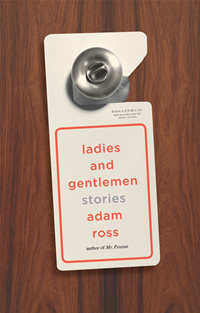“A Page from Chekhov’s Playbook”
This year, Adam Ross’s Ladies and Gentlemen had critics comparing him to the most celebrated practitioners of storytelling
Critics like to compare Nashville novelist Adam Ross to other writers, and not to your average, everyday, ordinary writers, either. Perhaps it’s inevitable that Ross, who is the author of Mr. Peanut (Knopf, 2010) and Ladies and Gentlemen (Knopf, 2011), should inspire the loftiest comparisons, for how often does a debut novelist rack up outrageous accolades in both translation and across the entire English-speaking world, including on the front page of The New York Times Book Review, and then turn in an equally compelling performance with a short-story collection barely a year later?
In any case, critics have elevated Ross into extremely rarefied company indeed, starting with Chekhov, no less. Dean Bakopoulos, writing in The New York Times Book Review led off, noting that the book’s “embedded narratives arrive effortlessly, in a page from Chekhov’s playbook.” Bakopoulos then went on to compare Ross to Raymond Chandler, Italo Calvino, Alice Munro, and Raymond Carver. Daniel Roberts picked up the name-dropping baton in The Rumpus, noting Ross’s similarity to James Salter and, again, to Carver—and then aimed even higher: “Perhaps more than any other influence, Ross is working in the tradition of a story master like Nathaniel Hawthorne, who penned tales that were short but haunting.”
 In The Boston Globe, Steve Almond, who didn’t much care for Mr. Peanut but who loved Ladies and Gentlemen, compared Ross to both James Baldwin and Philip Roth before noting, again, the influence of the Raymonds: “He has managed to wed the masterful plotting of Raymond Chandler with the exquisite characterization of Raymond Carver, to prove once and for all that exhibiting a deep empathy for your characters deepens the thrill as they, and we, barrel toward their fates.”
In The Boston Globe, Steve Almond, who didn’t much care for Mr. Peanut but who loved Ladies and Gentlemen, compared Ross to both James Baldwin and Philip Roth before noting, again, the influence of the Raymonds: “He has managed to wed the masterful plotting of Raymond Chandler with the exquisite characterization of Raymond Carver, to prove once and for all that exhibiting a deep empathy for your characters deepens the thrill as they, and we, barrel toward their fates.”
What storyteller can claim mastery of the art if at least one critic doesn’t compare him to Flannery O’Connor, as Liz Colville did in The Daily? But Michiko Kakutani—a critic who cannot read a book by Adam Ross without doling out praise with one hand and snatching it back with the other, this time turning her review in The New York Times into yet another opportunity to lecture Ross about his world view—felt obligated to note Ross’s similarity to the writer whose very name appears on the highest honor the genre can bestow: “Whereas ‘Mr. Peanut’ was a dazzling—and sometimes overly complicated—postmodern hall of mirrors, the stories in this volume are old-fashioned, almost O. Henryesque tales that point up both Mr. Ross’s extraordinary gifts as a writer and the limitations of his willfully bleak view of human nature.”
The way this small collection with very great aims has inspired comparisons to universally acknowledged masters of the craft is only one of the reasons Ross was interviewed this year by the luminaries of literary journalism, including Stephen Usery at WYPL in Memphis, John Siegenthaler for PBS’s A Word on Words, and WNYC’s Leonard Lopate. It’s also why Kirkus, which gave the book a starred review in May, has now listed it as Best Fiction of 2011 pick for short-story collections.
Here’s a quick survey of other critical responses to Ladies and Gentlemen:
 “One of Ross’ great strengths is walking that eternally fine line between showing the reader things—a bloody fistfight between brothers, or a Twilight Zone-esque reveal—and the heartbeat monitoring of a character’s internal life.” ~Kirkus Reviews
“One of Ross’ great strengths is walking that eternally fine line between showing the reader things—a bloody fistfight between brothers, or a Twilight Zone-esque reveal—and the heartbeat monitoring of a character’s internal life.” ~Kirkus Reviews
“Not only does Mr. Ross possess glittering powers of description and a heat-seeking eye for emotional and physical detail, but he’s also able to capture the way people talk today with fluency and panache. Though he tends to view the relationships between men and women through a shadowy, melodramatic prism, he is adept, when he wants to be, at showing the day-to-day stresses and consolations of marriage and mapping the mutations of love over time.” ~Michiko Kakutani, writing in The New York Times
“The short stories collected in Ladies and Gentlemen—less dazzling than Mr. Peanut, perhaps, but more impressive—are strong narratives unornamented by gimmick; still, certain pet motifs carry over, like Ross’ obsession with stories. To say that the author isn’t pretzeled by framing devices is not to say he employs none: many of the characters in these stories collect other people’s anecdotes—in fact, they seem to feed on them.” ~Henry Stewart, writing in The L Magazine
“‘Ladies and Gentlemen’ is clever in all the right ways, even while paying homage to the most traditional of forms. … [T]hese are all-enveloping tales, well paced, tense and driven by effortless prose. Reading them, you often want to leave the room before things get out of hand. But the stories are too riveting to abandon, the kind that make you ignore repeated calls to dinner.” ~Dean Bakopoulos, writing in The New York Times Book Review
“Ladies and Gentlemen is not a linked collection (such books, like Olive Kitteridge, have been in vogue recently) and is all the better for it. Instead of reappearing characters, the connector of these stories is the author’s strong, likeable voice, which remains apparent from story to story, in both third- and first-person narration. It’s a voice that favors crisp banter, brutal honesty, and often, morbidity (see: Mr. Peanut).” ~Daniel Roberts, writing in The Rumpus
“The seven substantial stories in the first collection by the author of Mr. Peanut take hold early and don’t let go.” ~Margaret Quamme, writing in The Columbus Dispatch
“These are traditional stories, written in precise and plainspoken prose, and devoid of the trickery that marred ‘Mr. Peanut.’ What makes them electrifying is the author’s knack for luring his characters into emotional danger. His tales build suspense by immersing us in the lives of average people, then demonstrating how easily such lives can tip into tumult.” ~Steve Almond, writing in The Boston Globe
“Ross is a master at delivering the unexpected, and every story in this collection will hit you with a surprise punch ending. Known for his ability to navigate difficult human relationships in Mr. Peanut, Ross does it again here, with a modern edginess that rings true to anyone who has ever endured difficult friendships or strained family connections. He dips our feet into uncomfortable waters and makes us face, with clarity, the horrific things we do to one another. From serious (The Holocaust) to surreal (being pranked on public TV), Ross sheds light on human insecurities and leaves us seeking redemption. Ross is no doubt one of the most brilliant writers of our time.” ~Julie Cantrell, writing in The Southern Literary Review
“Released just one year following the publication of his buzz-generating debut novel ‘Mr. Peanut,’ the seven stories that make up ‘Ladies and Gentlemen’ are both riveting and affecting—the work of an author who has the rare ability to mesmerize and move us.” ~Skip Horack, writing in the San Francisco Chronicle
“[V]ivid depictions of modern anxiety and a lament to humankind’s waning attachment to commitment, deftly told by one of the most accomplished new writers working in the United States today.” ~Yasmin Sulaiman, writing in The List
“I’m researching a novel about a musical actor and his son that’s set in the early 1980s, New York City. It’s the sunny period in the project’s life because I know the first and last line of the book and so I’m thrilled about it, obviously, it’s simply genius, because I haven’t actually written a word yet. Once I do, it’s all downhill from there.” ~Adam Ross describing his next project, a novel called Playworld, in an interview with Dan Coxon of Culturemob
“Does this constitute a coming attraction? Who knows? Not me. And I’m writing the goddamn thing.” ~Adam Ross on his novel-in-progress, Playworld
“Ross cares about how people accept moral ownership of their fate, and what prevents them from doing so: as his characters face the trickery of others, make resolutions, or have ‘defining moments,’ at stake is their ability to reflect morally on their lives.” ~Emily Cooke, writing in The Guardian
[This post was updated on January 17, 2012.]
Click here to read an excerpt from Ladies and Gentlemen, here to read Maria Browning’s review of the book for Chapter 16, and here to read Chapter 16’s interview with Ross. For more updates on Tennessee authors, please visit Chapter 16’s News & Notes page, here.
